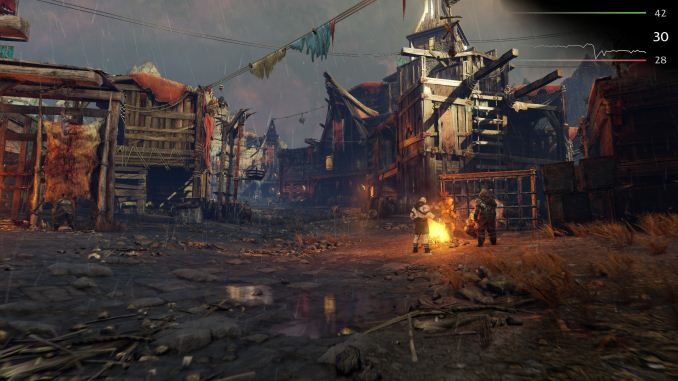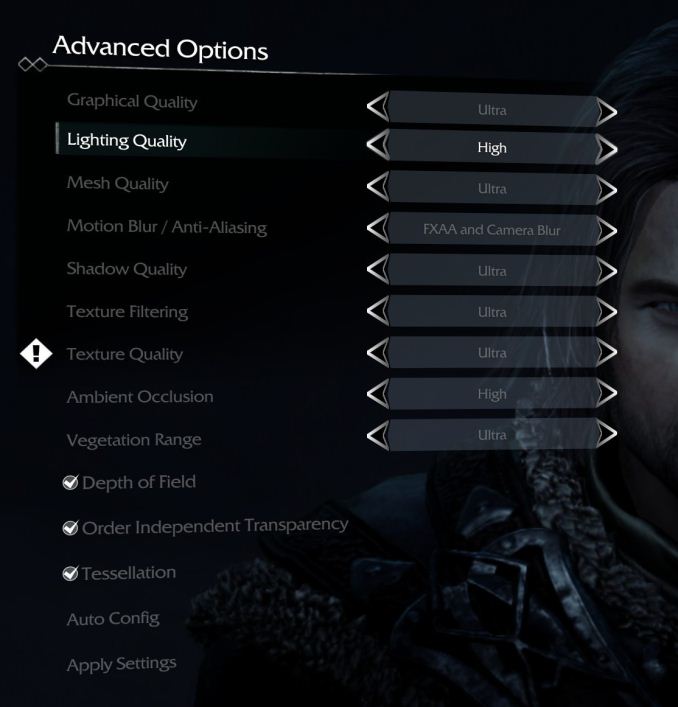The Intel Kaby Lake-X i7 7740X and i5 7640X Review: The New Single-Threaded Champion, OC to 5GHz
by Ian Cutress on July 24, 2017 8:30 AM EST- Posted in
- CPUs
- Intel
- Kaby Lake
- X299
- Basin Falls
- Kaby Lake-X
- i7-7740X
- i5-7640X
Shadow of Mordor
The next title in our testing is a battle of system performance with the open world action-adventure title, Middle Earth: Shadow of Mordor (SoM for short). Produced by Monolith and using the LithTech Jupiter EX engine and numerous detail add-ons, SoM goes for detail and complexity. The main story itself was written by the same writer as Red Dead Redemption, and it received Zero Punctuation’s Game of The Year in 2014.
A 2014 game is fairly old to be testing now, however SoM has a stable code and player base, and can still stress a PC down to the ones and zeroes. At the time, SoM was unique, offering a dynamic screen resolution setting allowing users to render at high resolutions that are then scaled down to the monitor. This form of natural oversampling was designed to let the user experience a truer vision of what the developers wanted, assuming you had the graphics hardware to power it but had a sub-4K monitor.
The title has an in-game benchmark, for which we run with an automated script implement the graphics settings, select the benchmark, and parse the frame-time output which is dumped on the drive. The graphics settings include standard options such as Graphical Quality, Lighting, Mesh, Motion Blur, Shadow Quality, Textures, Vegetation Range, Depth of Field, Transparency and Tessellation. There are standard presets as well.
We run the benchmark at 1080p and a native 4K, using our 4K monitors, at the Ultra preset. Results are averaged across four runs and we report the average frame rate, 99th percentile frame rate, and time under analysis.
For all our results, we show the average frame rate at 1080p first. Mouse over the other graphs underneath to see 99th percentile frame rates and 'Time Under' graphs, as well as results for other resolutions. All of our benchmark results can also be found in our benchmark engine, Bench.
MSI GTX 1080 Gaming 8G Performance

1080p



4K



ASUS GTX 1060 Strix 6GB Performance

1080p



4K



Sapphire R9 Fury 4GB Performance

1080p



4K



Sapphire RX 480 8GB Performance

1080p



4K



Shadow of Mordor Conclusions
Again, a win across the board for Intel, with the Core i7 taking the top spot in pretty much every scenario. AMD isn't that far behind for the most part.












176 Comments
View All Comments
Gulagula - Wednesday, July 26, 2017 - link
Can anyone explain to me how the 7600k and in some cases the 7600 beating the 7700k almost consistenly. I don't doubt the Ryzen results but the Intel side of results confuses the heck out of me.Ian Cutress - Wednesday, July 26, 2017 - link
Sustained turbo, temperatures, quality of chips from binning (a good 7600 chip will turbo much longer than a 7600K will), time of day (air temperature is sometimes a pain - air conditioning doesn't really exist in the UK, especially in an old flat in London), speed shift response, uncore response, data locality (how often does the system stall, how long does it take to get the data), how clever the prefetchers are, how a motherboard BIOS ramps up and down the turbos or how accurate its thermal sensors are (I try and keep the boards constant for a full generation because of this). If it's only small margin between the data, there's not much to discuss.Funyim - Thursday, August 10, 2017 - link
Are you absolutely sure your 7700k isn't broken? It sure looks like it is. I understand your point about margins but numbers are numbers and yours look wrong. No other benchmarks I've seen to date aligns with your findings. And please for the love of god ammend this article if it is.Hurr Durr - Monday, July 24, 2017 - link
One wonders why would you relegate yourself to subpar performance of AMD processors.Alistair - Tuesday, July 25, 2017 - link
Your constant refrain belonged in the bulldozer era (when the single threaded performance difference was on the order of 80-100 percent). Apparently you can't move past the Ryzen launch. If a different company such as Samsung had launched these CPUs the reception would have been very different. I've never bought AMD before but my Ryzen 1700 is incredible for its price, and I had to be disillusioned by my terrible Skylake upgrade first before I was willing to purchase from AMD.Gothmoth - Tuesday, July 25, 2017 - link
don´t argue with trolls....StevoLincolnite - Tuesday, July 25, 2017 - link
Why would Intel enable HT when they could sell it as DLC?https://www.engadget.com/2010/09/18/intel-wants-to...
coolhardware - Tuesday, July 25, 2017 - link
Glad to hear that the benchmarking is (becoming) less of a chore :-) Kudos and thank you for the great article!fallaha56 - Tuesday, July 25, 2017 - link
Surely that AVX drop -10 when overclocking was too much?What about delidding?
Samus - Monday, July 24, 2017 - link
It still stands that the best value in this group is the Ryzen 1600X, mostly because it's platform cost is 1/3rd that of Intel's HEDT. So unless you need those platform advantages (PCIe, which even x299 doesn't completely have on these KBL-X CPU's) it really won't justify spending $300 more on a system, even if single threaded performance is 15-20% better.Just the fact an AMD system of less than half the cost can ice a high end Intel system in WinRAR speaks a lot to AMD's credibility here.